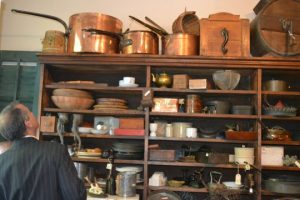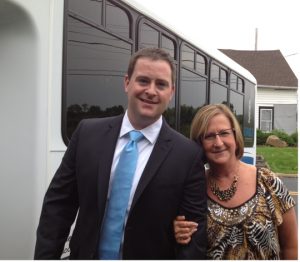Not surprisingly, when lawmakers addressed the Business and Professional Association of Western Delaware County, the topic of money featured prominently in the discussion.
The BPA invited state Rep. Steven Barrar, R-160, and state Rep. Chris Quinn, R-168, to speak at their monthly meeting at Brandywine Prime on Wednesday, Oct. 19.

Barrar started the conversation by noting that everything costs money. “Free” means someone else pays, he said. “Vote me out if I say ‘free,’” he said.
For that reason, he said the state is holding firm on the state university strike. State University faculty was offered 3 percent pay raises. Barrar asked how many people here are getting 3 percent raises? No hands went up. The sticking point is that faculty is being asked to teach five courses per year instead of four, which works out to about 10 hours of class time.
Jim McKinley owns a third-generation business, McKinley Blacksmith, Ltd. He asked for tax and health insurance relief for the small business. The burden is such that he doesn’t know if there will be a fourth-generation business, he said.
Barrar attributes the increase in health-care costs to the fact that insurance commissioners are not accountable. In the state of Delaware, insurance commissioners are elected. In Pennsylvania, they are appointed.
Touching on another revenue-related issue, he noted that the profits from the Liquor Control Board are dropping in part due to the pension fund crisis. Barrar described the change that now allows the sale of wine in the Acme supermarket in Glen Mills as the “first nail in the coffin in the state run system.” Wegmans has applied to sell wine as well.
The next step, according to Barrar is to allow beer distributors to sell spirits. These local competitors to state stores would allow the unprofitable state stores to fail. Barrar projected that incrementally the state stores would close, and liquor would be sold as any other commodity on the free market.
Another projected development involves Route 322. Barrar said that before he was elected in 1996, he owned a landscaping business.

When he bought his business in 1992, he was told there would be a disruption for the road’s widening. More than 20 years later, the project awaits a contract-signing in December at a cost of $200 million. The Route 1 to Route 261 segment is expected to take 18 months, and the Route 261 to I -95 segment is estimated to take 2 ½ years. There will be a public meeting in November, according to Barrar.
Both candidates are up for re-election. Quinn was elected in a special election in June to replace Tom Killion after Killion resigned to serve in the state Senate.
When Quinn was asked what the most important legislation was that he has worked on in his short period in the house, he replied the legislation to improve treatment of opioid addiction. Current treatment is only 15 days, which he deemed insufficient. “We are losing too many young people,” he said.
The meeting broke up early as people rushed to a television set to watch the presidential debate.
About Emily Myers
Emily Myers has lived and worked in Chadds Ford for over thirty five years. She founded the parent company of Chadds Ford Live, Decision Design Research, Inc., in 1982. ChaddsFordLive.com represents the confluence of Myers' long time, deep involvement in technology and community. Myers was a founding member of the Chadds Ford Business Association and currently serves on its board of directors. Her hobbies include bridge, golf, photography and Tai Chi. She lives with her husband, Jim Lebedda, in Chadds Ford Township.
- Web |
- More Posts(96)


 (6 votes, average: 3.50 out of 5)
(6 votes, average: 3.50 out of 5)

Comments